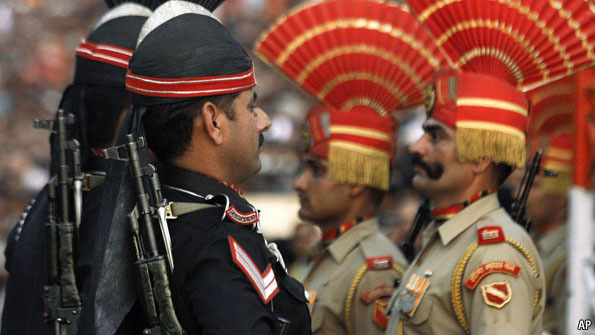Like every passing day, it’s been a nasty year again, shaping Indo-Pak relations into a new diaphragm keeping in mind the current thrust between both states with beheadings, attacks, deaths and firings in daily violations.
What is India-Pak relation about?
It is not about trade, neither about normalization, but it is a course of hype or one can say a hyperbole of South Asia, bursting with force posturing and blame game.
Combining their past and present bellicose relations, the responses made by each of them can be a good source of giving heat to existing fire and are even helpless in converting their relationship to get in line with peace.
There is an inherent divergence in relations between both states starting from water issue to Kashmir dispute, their people-to-people diplomacy, and asymmetry in their conventional capabilities.
Threatening one another is the core of Indo-Pak relations; which also explains that the little relationship is unsolvable where one’s fear feeds the other. It has turn into more of an enigma which no one can solve.
For instance, take Kashmir. This has been a flashpoint for decades. India is supposed to understand that its forces have been involved in the systematic use of torture there. There has been a widespread use of violence by Indian troops from torturing to mass killings.
Remember the Mumbai attack.
A False Flag! That has deepened the hostility among the peoples across the divide. Kasab proved to be an Indian and a Hindu too, who had no Islamic inclinations and was heard calling Bhagwan on video to have mercy. Also, it’s impossible for anybody just to sail into other countries territory with arms in hand.
So, in a realistic scenario, the recent Uri attack in India and her blaming and lamenting of Pakistan to be responsible doesn’t make sense, and there is a point where Pakistan cannot let the conventional parity grow out of whack.
Now this event of September where terrorists attacked Uri Headquarter, haunts the relations of both States to war like situation. It all doesn’t end here. One after the other, from Mumbai attack to Pathankot and now this episode of Uri, Pakistan has been hard-nosed by India with different ways as a terrorist state or perpetrator to such acts. But we haven’t lost faith yet. Sooner or later, the truth will prevail.
Those advocating Pakistan being responsible for such acts without having proper insight to what happens and creating a false flag situation must also give an idea; what purpose they have in mind? Do they want a nuclear war? How will they resolve the problems that exist in both states without which peace is not possible? But to my knowledge, this is not the time where India should declare a total isolation of Pakistan but should work for peace in a collaborative manner. One must give an end to this jingoistic nature of teaching lessons to one another.
So, in this tug of war where words are more valuable rather than what truth is, Pakistan has to look for other options to respond in a way that stability must sustain. Pakistan’s nuclear weapons are meant to compensate for conventional asymmetry as India has deployed half of its Army’s total strength in Kashmir.
However, asymmetry created in regards of weapons import by India is also an upsetting concern for the region. This is creating a more subtle conventional imbalance. In such a scenario Pakistan relied on tactical nuclear weapons nudging the military imbalance in the right direction to offset the asymmetry.
Adding more into the potentially dangerous situation where India has started lobbying to isolate Pakistan internationally. U.S. lawmakers have also moved a bill to designate Pakistan as a state sponsoring terrorism which has dwelled the relation more into a fragile situation between both India and Pakistan. Also, is it a legal step taken by U.S. lawmakers? Where Pakistan has already been playing a vital role in fighting this war on terror and is the only nation being hit more with terrorist attacks and has suffered an increased number of losses.
The problem with this fragile state of affairs is not simple, where Pakistan has struggled for making inroads for peace and stability. And India has been responding the other way around. What one fears is the statements given by Indian higher officials to counter in a way which will lead to a more critical situation like limited nuclear war. From all this, one thing is certain that Modi has not developed any policy to engage with Pakistan for making peace and stability in the region.

